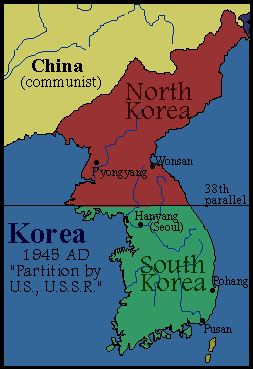

|
|
 Korea Divided Korea DividedAlthough by the beginning of 1945 the United States anticipated complete victory over Japan in World War II, the tenacious resistance of the remaining Japanese forces and the onset of the suicidal kamikaze attacks portended that the final invasion of the home islands of Japan would be incredibly costly in both life and material. In order to bring the war with Japan to an end as quickly as possible, the United States and Great Britain persuaded the USSR at the Yalta Conference in February 1945 to attack Japanese forces in China within three months after the surrender of Nazi Germany. Earlier in the war, the U.S., Great Britain, France, and the USSR had all agreed that Korea should be reestablished as an independent state after the defeat of Japan. However, as the time of the invasion of Japan approached, it was also agreed as a military expedient that the USSR would accept the surrender of Japanese forces in Korea north of the parallel of latitude at 38 N, while the U.S. would accept the surrender of Japanese forces in Korea south of the same thirty-eighth parallel. The war with Germany ended on May 8, 1945 and, as agreed, the USSR declared war on Japan on August 8 and attacked Japanese forces in Manchuria the next day. Meanwhile, the U.S. dropped an atomic bomb on Hiroshima on August 6, and another one on Nagasaki on August 9. As a result, Japan surrendered on August 14, ending the war less than a week after the Soviet attack. However, in keeping with the earlier agreement, the USSR occupied Korea north of the thirty-eighth parallel while the U.S. occupied Korea south of the thirty-eighth parallel. The original plan had been to withdraw all occupation forces from Korea as quickly as possible to allow the Koreans to get on with rebuilding their land and political identity. Unfortunately, Cold War tensions and rivalries prevented the formation of a unified Korea. The Soviets imposed a communist government on North Korea, resulting in the formation of the Democratic People's Republic of Korea in 1948, while the U.S. imposed a nationalist/capitalist democracy on South Korea, resulting in the formation of the Republic of Korea in 1948. The resulting differences in political and economic structures between the two Koreas drove the two pieces of the former nation apart. Efforts to reunify Korea broke down over which of the two new Korean governments would control the whole. Unification became a major political objective of each of the two halves, leading to tension, armed subversion, and eventually war--the Korean War.
[ Korea Yesterday ] [ Old Choson Period ] [ The Three Kingdoms ] [ Home ] [ Teacher Pages ] [ Modules & Activities ] |
HTML code by Chris Kreger
Maintained by ETE Team
Last updated April 28, 2005
Some images © 2004 www.clipart.com
Privacy Statement and Copyright © 1997-2004 by Wheeling Jesuit University/NASA-supported Classroom of the Future. All rights reserved.
Center for Educational Technologies, Circuit Board/Apple graphic logo, and COTF Classroom of the Future logo are registered trademarks of Wheeling Jesuit University.